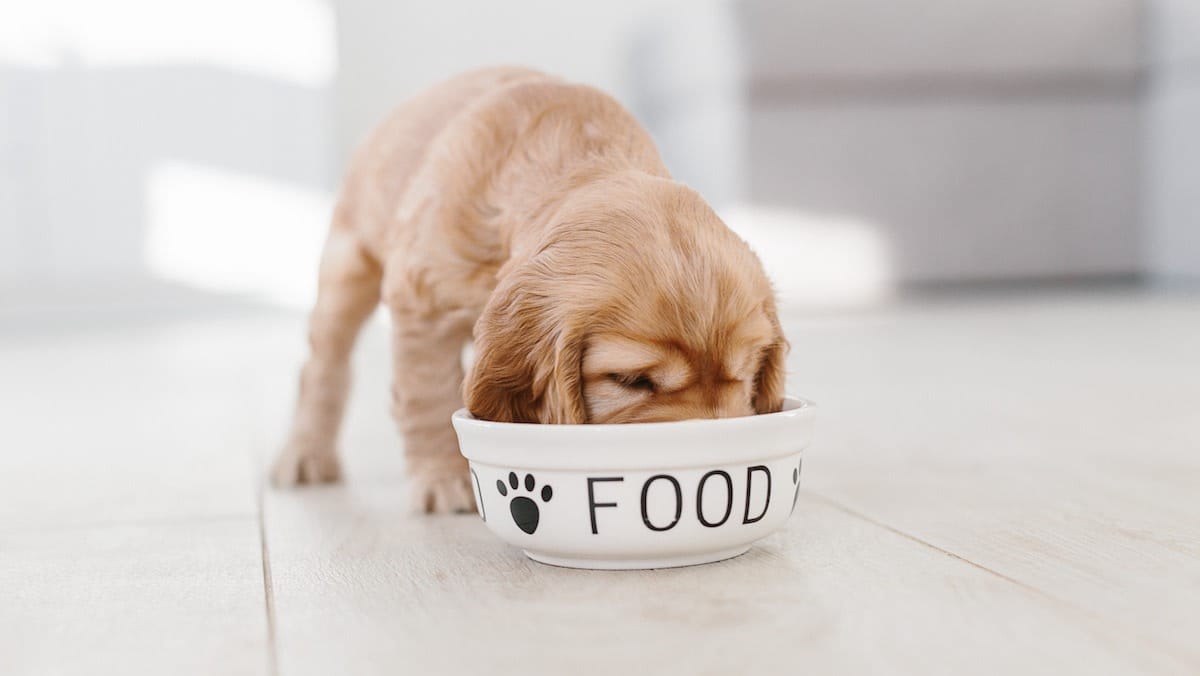Feeding a new puppy can be a daunting task, especially for first-time pet owners. One of the most common questions that new puppy owners have is what times they should feed their furry friend. The answer to this question largely depends on the age of the puppy and their individual needs.

For very young puppies, it is recommended to feed them small meals throughout the day. This is because their stomachs are still developing and cannot hold large amounts of food at once. As they grow older, their stomachs will expand and they will be able to eat larger meals. It is important to consult with a veterinarian to determine the appropriate feeding schedule for your puppy based on their age and breed.
Understanding Puppy Nutritional Needs
Puppies require a balanced diet to support their growth and development. As a responsible pet owner, it is important to understand the nutritional needs of your puppy to ensure they receive the necessary nutrients for optimal health.

Importance of Balanced Diet
A balanced diet is essential for puppies to maintain good health. A balanced diet should include a combination of protein, carbohydrates, fats, vitamins, and minerals. Protein is important for muscle growth and repair, while carbohydrates provide energy for daily activities. Fats are necessary for healthy skin and coat, and vitamins and minerals play a crucial role in maintaining a strong immune system.
It is important to note that overfeeding your puppy can lead to obesity and other health problems. Portion control is crucial to ensure your puppy receives the appropriate amount of nutrients for their size and age.
Growth Stages and Dietary Requirements
Puppies have different dietary requirements depending on their age and size. During the first few weeks of life, puppies rely on their mother's milk for nutrition. As they grow, their nutritional needs change, and they require more solid food.
From four to six weeks of age, puppies should be fed four small meals a day. From six to twelve weeks of age, puppies should be fed three meals a day. After twelve weeks of age, puppies can be fed two meals a day.
It is important to choose a high-quality puppy food that is appropriate for your puppy's breed and size. Consult with your veterinarian to determine the best feeding schedule and diet for your puppy.
By understanding your puppy's nutritional needs and providing a balanced diet, you can help ensure their health and happiness for years to come.
Determining Feeding Times
When it comes to determining feeding times for your puppy, there are a few important factors to consider. Age and activity level are two key considerations that can help you establish an appropriate feeding schedule.
Age-Based Feeding Schedules
Puppies require more frequent feeding than adult dogs, as they have smaller stomachs and higher energy needs. As a general rule, puppies should be fed three to four small meals per day until they are six months old. After six months, you can gradually transition to two meals per day.
It's important to note that the specific feeding schedule may vary based on your puppy's breed, size, and individual needs. Consult with your veterinarian to determine the best feeding schedule for your puppy.
Activity Level Considerations
In addition to age, your puppy's activity level can also impact their feeding schedule. Puppies who are more active may require more frequent feedings to fuel their energy needs, while less active puppies may require fewer feedings.
It's important to pay attention to your puppy's behavior and adjust their feeding schedule accordingly. If your puppy seems hungry between meals, you may need to increase the frequency of feedings. On the other hand, if your puppy seems lethargic or uninterested in food, you may need to decrease the frequency of feedings.
By considering your puppy's age and activity level, you can establish a feeding schedule that meets their nutritional needs and supports their overall health and wellbeing.
Feeding Frequency
Feeding frequency is an important aspect of puppy care that should not be overlooked. Puppies have different nutritional needs than adult dogs, and their feeding schedule should reflect this.
Early Puppyhood
During the first few weeks of life, puppies rely solely on their mother's milk for nutrition. However, as they grow, they will require more frequent feedings. It is recommended that puppies be fed three to four times a day until they are about six months old. This will ensure that they are receiving the proper amount of nutrients to support their growth and development.
Transition to Adult Feeding
Around six months of age, puppies can begin to transition to adult feeding. This process should be done gradually over a period of several weeks to avoid digestive upset. During this time, it is recommended that puppies be fed two to three times a day. However, the exact frequency will depend on the individual dog's needs and activity level.
It is important to note that feeding frequency should not be the only consideration when it comes to a puppy's diet. The quality and type of food, as well as portion size, should also be taken into account. Consult with a veterinarian to determine the best feeding plan for your puppy.
Types of Puppy Food
When it comes to feeding your puppy, there are various types of food available in the market. It is important to choose the right type of food for your puppy's specific needs. Here are some of the most common types of puppy food:
Wet Food Vs. Dry Food
Wet food, also known as canned food, is a popular choice among puppy owners due to its high moisture content. This type of food can be beneficial for puppies who do not drink enough water or have dental problems. However, wet food can be more expensive than dry food and can spoil quickly once opened.
On the other hand, dry food is a convenient and affordable option for puppy owners. It is easier to store and can be left out for longer periods without spoiling. Dry food can also help keep your puppy's teeth clean and healthy. However, some puppies may not like the texture of dry food and may require more water intake.
Homemade Diets and Raw Food
Some puppy owners prefer to make their own puppy food at home or feed their puppies a raw food diet. While these options can provide more control over the ingredients and quality of the food, it is important to consult with a veterinarian or animal nutritionist to ensure that the puppy is receiving a balanced and complete diet.
Homemade diets can be time-consuming and require careful planning to ensure that the puppy is receiving all the necessary nutrients. Raw food diets can also be risky as they can contain harmful bacteria and parasites. It is important to handle and prepare raw food properly to avoid any health risks to the puppy.
In conclusion, choosing the right type of food for your puppy is crucial for their overall health and well-being. It is important to consider your puppy's individual needs and consult with a veterinarian or animal nutritionist before making any changes to their diet.
Portion Control and Measuring Meals

Proper portion control and measuring meals are crucial for the health and well-being of your puppy. Feeding your puppy too much or too little can lead to obesity, malnutrition, and other health problems.
To ensure you are feeding your puppy the right amount, it's important to measure their food. Use a measuring cup or a kitchen scale to accurately portion out their meals. This will help you keep track of how much your puppy is eating and make adjustments as necessary.
It's also important to follow the feeding guidelines on your puppy's food packaging. These guidelines are based on your puppy's age, weight, and activity level. If you are unsure about how much to feed your puppy, consult with your veterinarian.
In addition to measuring meals, it's important to establish a feeding schedule for your puppy. Puppies should be fed three to four times a day until they are six months old. After six months, they can be fed twice a day. It's important to stick to a consistent feeding schedule to help regulate your puppy's digestion and prevent overeating.
Finally, it's important to monitor your puppy's weight and adjust their food intake as necessary. If your puppy is gaining too much weight, reduce their food intake slightly. If they are losing weight or appear to be hungry all the time, increase their food intake.
By practicing proper portion control and measuring meals, you can help ensure your puppy grows up healthy and happy.
Monitoring Puppy's Health and Growth
Weight Tracking
Monitoring a puppy's weight is an essential part of ensuring their health and growth. Puppies should be weighed regularly, at least once a week, until they are fully grown. Keeping track of their weight can help identify any potential health issues early on.
A weight tracking chart can be helpful to keep track of your puppy's weight over time. You can use a simple table or a graph to plot their weight. If you notice any sudden changes in your puppy's weight, it's essential to consult with a veterinarian.
Adjusting Diet for Health Issues
Puppies may develop health issues that require a change in their diet. For example, if a puppy has allergies or intolerances, they may need to switch to a different type of food. If they have a medical condition such as diabetes, they may need a specific diet to manage their symptoms.
It's crucial to consult with a veterinarian before making any changes to your puppy's diet. They can provide guidance on the best food options for your puppy's specific needs. It's also important to monitor your puppy's reaction to any changes in their diet and adjust accordingly.
Overall, monitoring a puppy's health and growth is an essential part of being a responsible pet owner. By keeping track of their weight and adjusting their diet as needed, you can help ensure that they grow up healthy and happy.

Training and Mealtime Behavior
Training your puppy to have good mealtime behavior is important for both their health and your sanity. Here are some tips for establishing healthy eating habits:
- Set a schedule: Puppies thrive on routine, so establish set meal times and stick to them. Most puppies will need to eat three to four times a day until they are six months old, and then twice a day until they are a year old. After that, once a day is usually sufficient.
- Use positive reinforcement: Reward your puppy for good behavior during meal times. This can include sitting calmly, waiting patiently, and not begging. Use treats or praise to reinforce good behavior.
- Avoid free-feeding: Leaving food out all day can lead to overeating and obesity. Stick to set meal times and remove any uneaten food after 20 minutes.
- Don't feed table scraps: Human food can be harmful to dogs and can also encourage begging behavior. Stick to a high-quality puppy food and limit treats to those specifically made for dogs.
- Consider using puzzle feeders: These toys can help slow down fast eaters and provide mental stimulation during meal times.
By establishing a routine and using positive reinforcement, you can help your puppy develop healthy mealtime behavior that will benefit them for years to come.
Feeding Tips and Best Practices
When it comes to feeding your puppy, it's important to establish a routine that works for both you and your furry friend. Here are some feeding tips and best practices to keep in mind:
- Stick to a schedule: Puppies thrive on routine, so it's important to establish set feeding times. Aim for three to four small meals a day, rather than one or two large ones. This will help prevent overeating and reduce the risk of digestive issues.
- Choose high-quality food: Look for a puppy food that is high in protein and contains all the essential nutrients your furry friend needs to grow and develop. Avoid foods that contain fillers, artificial colors, and preservatives.
- Measure portions carefully: Use a measuring cup to ensure you're feeding your puppy the correct amount of food. Overfeeding can lead to obesity, which can cause a range of health problems.
- Provide fresh water: Make sure your puppy always has access to fresh, clean water. Change the water in their bowl daily and wash the bowl regularly to prevent the buildup of bacteria.
- Avoid feeding table scraps: Human food can be high in fat and salt, which can be harmful to your puppy's health. Stick to feeding them their own food and treats designed specifically for puppies.
By following these feeding tips and best practices, you can help ensure your puppy grows up healthy and happy.

Conclusion
In conclusion, establishing a consistent feeding schedule is essential for providing your puppy with the nourishment they need to thrive. By following the guidelines outlined in this article and paying attention to your puppy's individual needs, you can ensure that they grow up healthy, happy, and full of vitality.
Frequently Asked Questions
- How often should I feed my puppy throughout the day?
- Puppies require frequent feedings to support their rapid growth and development. It is recommended to feed puppies three to four times a day, with meals evenly spaced throughout the day.
- What is the recommended feeding schedule for a puppy?
- The recommended feeding schedule for a puppy varies depending on their age and size. Generally, puppies should be fed three to four times a day until they are six months old. After six months, they can be transitioned to two meals a day.
- At what age should I reduce my puppy's feedings from three to two times a day?
- Puppies can be transitioned to two meals a day once they reach six months of age. However, larger breeds may benefit from three meals a day until they are fully grown.
- What is the ideal time for the last puppy meal of the day?
- The last puppy meal of the day should be given at least three hours before bedtime to allow for proper digestion. This can help prevent digestive issues and promote better sleep.
- How should I adjust my puppy's feeding times as they grow?
As puppies grow and their nutritional needs change, their feeding schedule may need to be adjusted. It is important to consult with a veterinarian to determine the best feeding schedule for your puppy based on their age, size, and activity level.
- Can you provide a feeding chart for puppies based on their age and weight?
- Feeding charts can be a helpful tool in determining the appropriate amount of food to give your puppy based on their age and weight. However, it is important to remember that every puppy is unique and may require different amounts of food. It is recommended to consult with a veterinarian to determine the best feeding plan for your puppy.




